A new program to improve two-way contacts between the government and people of the Republic of China, entitled "Face to Face" was opened by the China Television Service on Nov. 19 last year. Government officials, scholars and representatives of the public appearing on the program have openly discussed issues of public concern and answered questions candidly and in revealing detail. Observers said after viewing the program that it was a direct result of democratic policies pursued by the government over the past 30 years. It showed that government officials are knowledgeable and eloquent enough to communicate with the public in a sincere way. At the same time, it was apparent from the searching questions raised that the people are deeply concerned over state affairs.
The program, through promoting communications and exchanges of opinions between the government and people, is meant to help the public understand government policies and achievements on the one hand, and to inspire constructive suggestions to develop the nation through cooperative efforts on the other.
In the U.S., the three main TV networks have similar programs, such as "Issues & Answers" on ABC, "Meet the Press" on NBC, and "Face the Nation" On CBS. Government officials in the Republic of China have often appeared on TV, but in most cases they made speeches in a stiff, official manner and confined themselves to formal announcements and outlines rather than giving "inside information" of real interest to the public. Since its first showing, "Face to Face" has been immensely popular, prompting the organizers to extend the time from 60 to 75 minutes.
The program has created great public interest because it has investigated the most important and sensitive problems connected with the policies and well-being of the nation. In answering questions, government officials expressed their views candidly, and gave the public precise answers on subjects under their purview. After each program, the CTS programming and press sections received numerous phone calls from members of the public wishing to express their opinions and congratulations. The response came from all levels of society, including professors, overseas Chinese, and scholars from abroad participating in the National Development Seminar, government officials, students, soldiers and businessmen. The enthusiastic response from the public greatly encouraged the staff of the program, particularly since most opinions were in support of the government.
In short, "Face to Face" has enabled viewers to understand the government's achievements and policies more clearly as a result of explanations given by government officials. Through direct two-way contacts, the government has also been able to clarify doubts and dispel rumors. Young people feel they are participating directly in administrative work through the inclusion of students in the program. In addition, the officials' modest and authoritative speeches and candid answers to questions have fully shown that they are intelligent, responsible and familiar with their jobs, thereby further gaining public support for the government.
As program host Chu Yao-long put it, "This is a small step for democracy in the Republic of China, but a large step in TV's role in society."
The first official to accept the challenge of the program were Dr. James Soong, director-general of the Government Information Office, Chi Hsing-po, director of the GIO's TV and radio department, and Chiang Cho-min, director of the movie department. Reporters and students asked questions on topics ranging from the length of entertainers' hair to the censorship of pop songs and movies. The questions raised were all very much to the point and of interest to the public. Dr. Soong was frank and outspoken in his answers and promised to solve the problems raised as soon as possible.
Dr. Soong did not deny that he had encountered some difficulties during his first year of office, but said he has always been confident that as long as he is sincere with people and conscientious in his duty, he will overcome them. He emphasized that today, a government official must work for the public's interest instead of for personal fame and profit. Dr. Soong agreed that a spokesman for the government of the Republic of China should use the most precise language to express his views on behalf of the government. He said that in communicating with journalists, the most important thing is to establish mutual trust. He also expects and encourages reporters to be specialized in their work, but added that a good reporter may not necessarily be proficient in administrative work. He urged reasonable pay scales for experienced reporters so they could become more specialized and provide more in-depth information for readers. He also said reporters should check their facts to establish the public's confidence in the credibility of the Press. The press must shoulder its responsibility to monitor the government, but must not neglect the importance of the public's role in social Progress. It should avoid distorting or exaggerating the facts in a way which might cause an adverse impact on youth.
He said the GIO is willing to lift the "one third" requirement on TV song programs if the networks promised to institute similar controls themselves. The GIO stipulates that songs which it has previewed and purified must make up at least a third of singing entertainment programs. The GIO first drafted this regulation in answer to demands from viewers.
Chi pointed out that sometimes the GIO is wrongly accused of prohibiting songs, and is actively seeking an improvement to song publication regulations. Songs are censored first by the GIO department of publications, and then by the TV and radio department if they are to be sung on TV programs. Dr. Soong disclosed that he is organizing a single integrated body to examine songs in one operation.
During the TV program, Dr. Soong also said that the GIO will allow housewives and students to sit in during movie previews.
Dr. Soong said the GIO is seeking opinions from members of the public before taking other measures to improve movie preview. This brought a particularly favorable reaction from viewers.
In the Nov. 26 "Face to Face" show, Dr. Fredrick F. Chien, Vice Minister of Foreign Affairs, categorically denied that combat ships of the Soviet Union have ever visited any port in the Republic of China. Dr. Chien described as "groundless" foreign wire reports that Soviet ships have, on certain occasions, visited Makung in Penghu (Pescadores) for repair purposes. "In a most serious and responsible manner, I want to say that nothing of the sort has ever happened," Dr. Chien said. The government has many times reiterated its firm stand that the Republic of China will not contact the Soviet Union, and that this stand is by no means based on dogmatism or sentimentality.
"So far as I can recall, the Republic of China has on many occasions sought cooperation with the Soviet Union since 1918, only to find miserable results," Chien said. "History has taught us a lesson," he added.
The Vice Foreign Minister indicated, however, that trading with Eastern European countries is under consideration. He said that since goods exported from the Republic of China to Southeast Asia have found their way to Eastern Europe, it might be a good idea to consider trading with the Eastern European bloc. Dr. Chien quoted Foreign Minister Y. S. Tsiang as saying that the Republic of China will contact any country whose policy does not contradict the Three Principles of the People, or which upholds freedom and democracy.
Answering a college student, Dr. Chien said it is absolutely impossible for the Republic of China to renew its membership in the United Nations since the Chinese Communists have held the seat on the Security Council, since the ROC withdrew from the U.N. on Oct, 26, 197l. He said, however, that the Republic of China will continue to abide by the U.N. Charter even though it is no longer a U.N. member.
Asked to define the "flexible foreign policy" adopted by the government, Dr. Chien said "flexibility" means the selection among a series of options of one that promises the maximum benefits with the least undesirable effects. Since the U.S. switched recognition to Communist China, the Republic of China has suffered a series of diplomatic setbacks, while there are only 22 countries maintaining diplomatic relations. A "flexible foreign policy" has therefore been adopted to meet the changing circumstances.
In the wake of these setbacks, the Republic of China is making every effort to expand its foreign trade. Dr. Chien said the growing international trend of trade protectionism has affected the Republic of China's export growth. But despite the problem, the annual average growth in foreign trade has been more than 25 percent during the past few years.
Kung Ling-cheng, Director-General of the National Police Administration, the next official to appear on the program, discussed public security and the law. Kung said that as policemen are human beings, they have their defects and merits. Promising to improve the working morale and living conditions of the police, he stressed that police enforcement of the law is necessary to maintain social stability.
Dr. Shih Chi-yang, Political Vice Minister of Education, appeared in the next program to discuss educational policies and problems. Three important points he touched on were problems arising over increases in tuition fees, educational investment, and a standardized method of writing Chinese. He considered it inappropriate for students to assist in election campaigns, because it would influence their studies. They could, however, make their opinions known through seminars.
On December 17, director Tsu Sung-chiu and deputy director Chao Sou-po of the department of cultural affairs, and deputy director Chu Chien-chang of the department of organizational affairs of the Central Committee of the Kuomintang, were invited to discuss "the Kuomintang after the 4th Plenary Session of the 11th Central Committee." Director Tsu pointed out the implementation of democratic constitutional rule is the unchanging policy of the Kuomintang. Chao said the Kao-hsiung riot was a violation of the law which had impeded the development of democracy. Asked if martial law can also influence the development of democracy, Chao said that in fact, martial law is a product of democracy, since a despotic government would not need it. He said the government cannot lift martial law because the Peiping regime has never ceased conspiring to take over the Republic of China. Even Great Britain had to proclaim martial law during the two world wars. He pointed out anybody who is law-abiding will not be inconvenienced by martial law. Director Tsu said the by-election suspended last year will be rescheduled soon, and the number of vacancies will be increased to allow more people to participate in politics.
On the eve of 1980, "Face to Face" invited Taiwan Provincial Governor Lin Yang-kang to talk on "Taiwan today and tomorrow." Governor Lin first gave his views on the Kaohsiung riot and the future of ROC's political development. He said that democracy and the law are inseparable, and everyone must uphold the dignity of the law. "Even if your objective is in the national interest and is reasonable, you are not allowed to promote it through violence or any other illegal means," Lin said. He added that he hopes the public appreciates the peace, prosperity and stable social order which prevail in the Republic of China. Only through expressing their will in a peaceful way can the people preserve the fruits of progress. Gov. Lin said as democracy means rule by the people, government, educational and police officials must make sure they are meeting the needs of the public. The officials must hear grievances, complaints, and suggestions from the public so as to fulfill the people's aspirations as quickly as possible.
Governor Lin emphasized that all men are equal before the law. Violence or other illegal methods are not allowed in expressing criticism of the government, to ensure social harmony and stability.
Governor Lin also condemned a few "Taiwan independence" elements overseas who attacked the ROC's official institutions in the United States after the Kaohsiung riot. He said they should not give biased speeches to insult the ROC government and to confuse world opinion. He assured the public that in handling the Kaohsiung riot, the government will not punish innocent people.
In the second half of the program, Gov. Lin discussed provincial political affairs with people's representatives from all or Taiwan. Topics covered included improving the aborigines' living standards, dredging waterways in Er Chung to prevent floods, strengthening communications with people at the basic level, and stabilizing prices of agricultural products. Gov. Lin's detailed answers were well received by the public.
Gov. Lin said that during his 18-month tenure of office, he has been satisfied with the stability, progress and unity achieved by the nation under the leadership of the government despite the break in diplomatic relations between the Republic of China and the United States. To implement central government policy, the provincial government has promulgated many important plans, including 12 new major construction projects, which are progressing according to schedule. The provincial government has also revised some inconvenient and impractical laws, and increased its financial aid for small towns and counties to speed up development. Gov. Lin also said that to maintain "clean" politics, both the government and people must abide by the rule of law.
As the first series of 13 "Face to Face" programs draws to a close, it is a matter of pride that government officials have shown such candidness and competence in their areas of responsibility. Undoubtedly, after seeing the programs, the people can no longer be indifferent to state affairs, and will boldly step forward to express their opinions. Through such two-way contacts, the people and government will jointly help to promote unity and harmony.
[Picture Caption]
Dr. James Soong (second from right), director general of the Government Information Office, talks about mass media under the title of "The shortest channel."
Reporters taking part in the program
Dr. Fredrick F. Chien, Vice Minister of Foreign Affairs, talks about diplomatic problems.
Kung Ling-cheng (front), director-general of the National Police Administration, discusses public security and the law.
Dr. Shih Chi-yang, Political vice Minister of Education, answers questions raised about educational policies and problems.
From Left: deputy director Chu Chien-chang of the department of organizational affairs of the Central Committee of the Kuomintang, director Tsu Sung-chiu and deputy director Chao Sou-po of the department of cultural affairs, discuss "the Kuomintang after the 4th Plenary Session of the 11th Central Committee."
Taiwan Provincial Governor Lin Yang-kang talks on "Taiwan today and tomorrow."
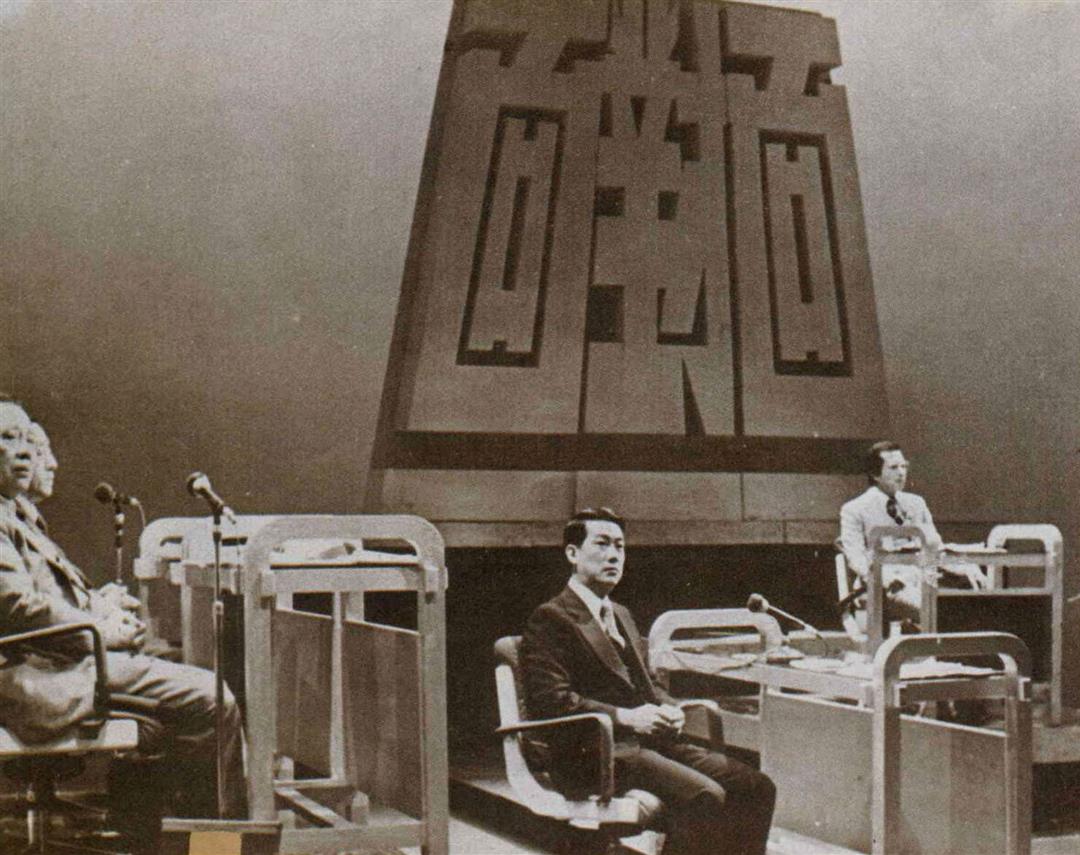
Dr. James Soong (second from right), director general of the Government Information Office, talks about mass media under the title of "The shortest channel.
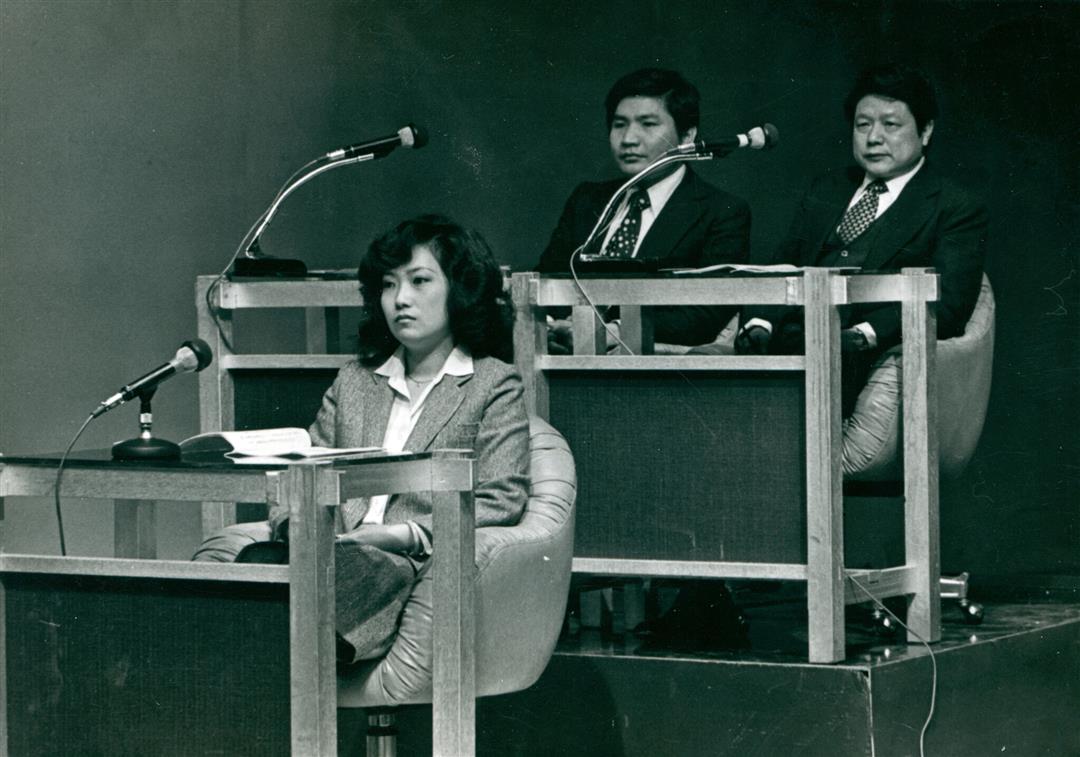
Reporters taking part in the program.
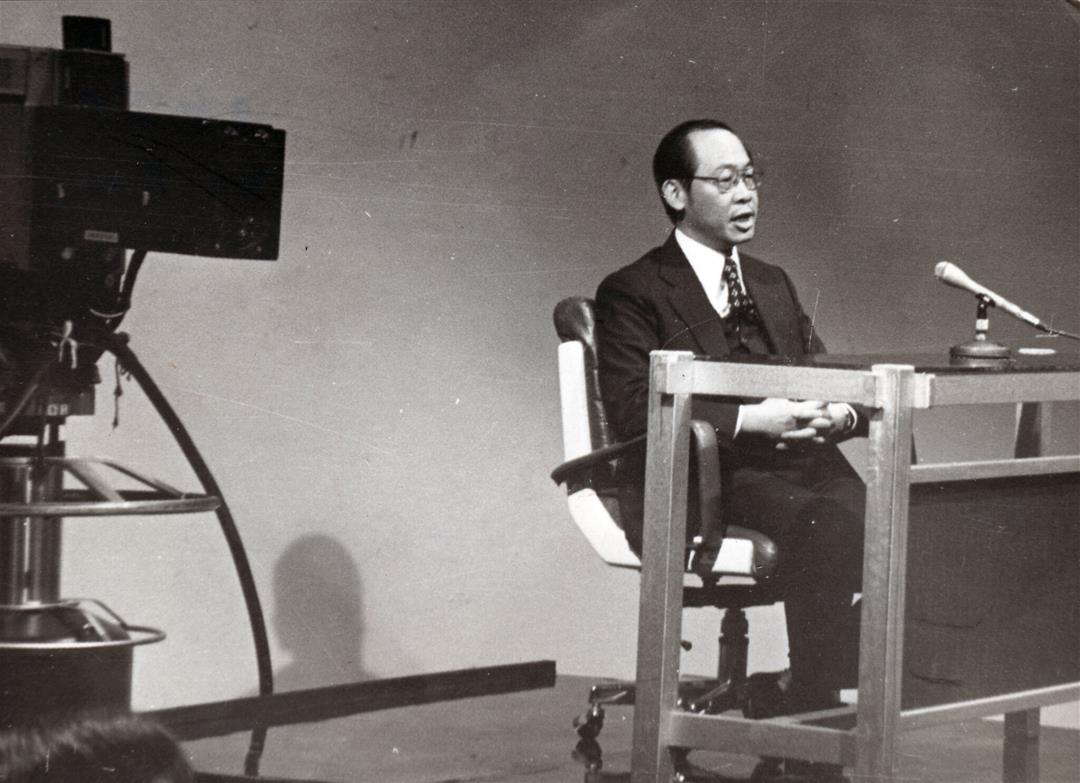
Dr. Fredrick F. Chien, Vice Minister of Foreign Affairs, talks about diplomatic problems.
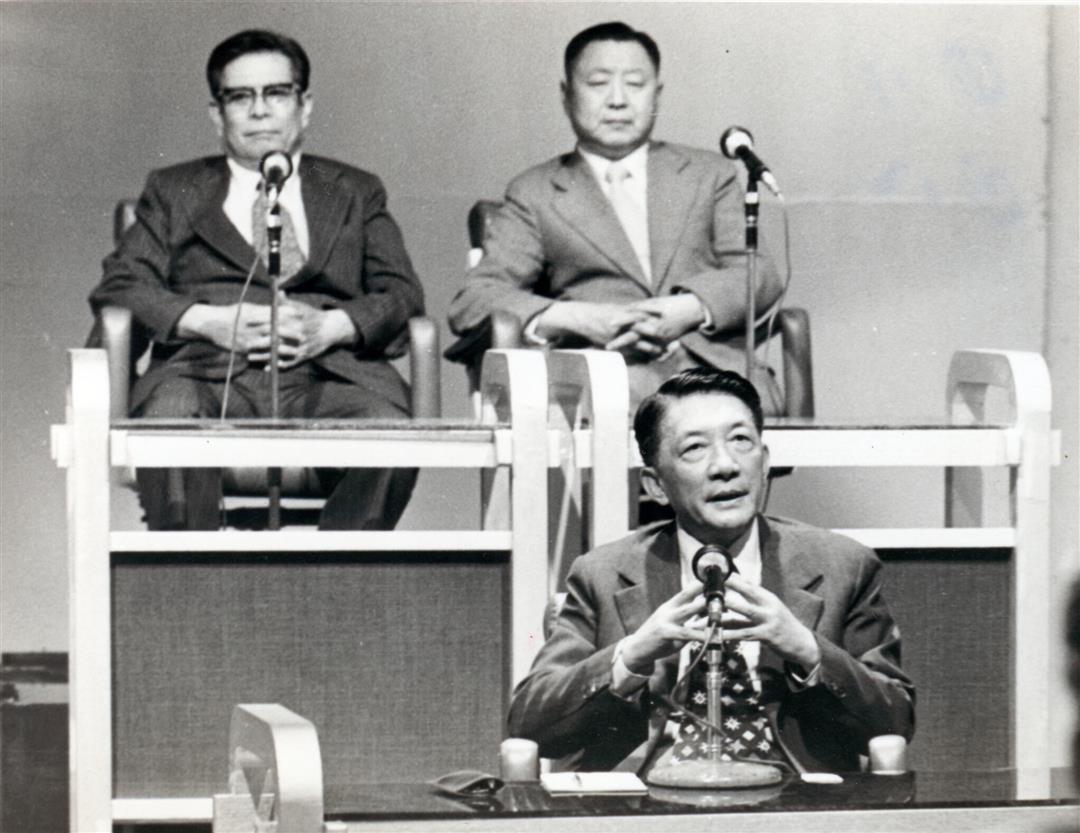
Kung Ling-cheng (front), director-general of the National Police Administration, discusses public security and the law.
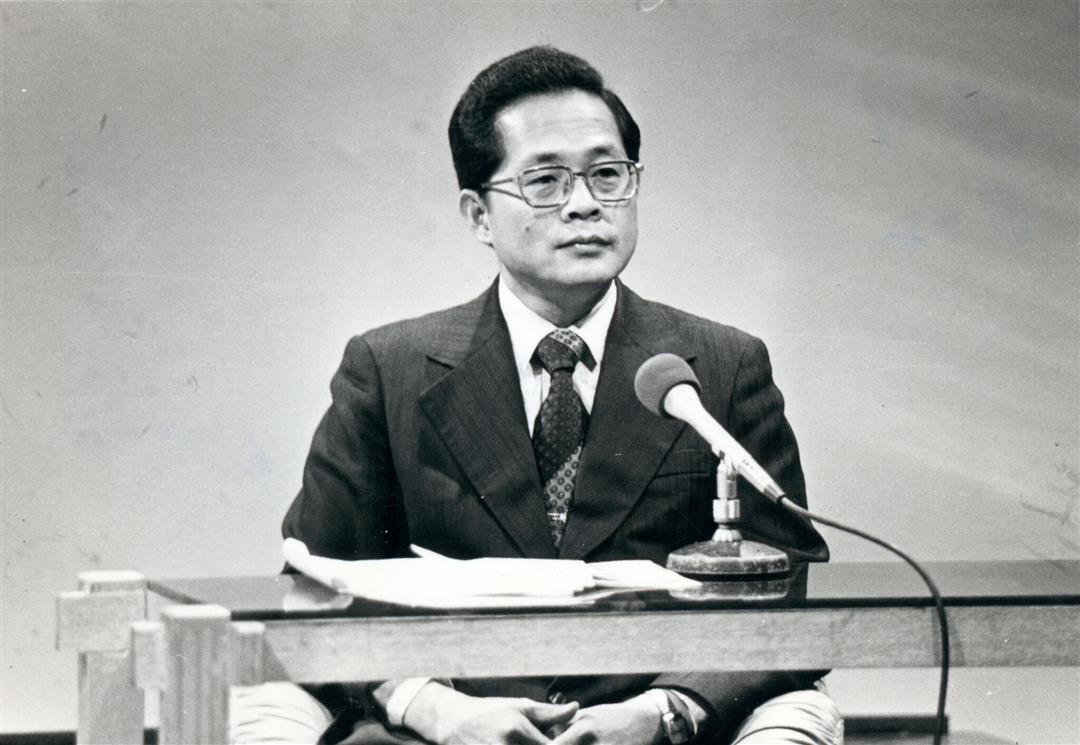
Dr. Shih Chi-yang, Political vice Minister of Education, answers questions raised about educational policies and problems.
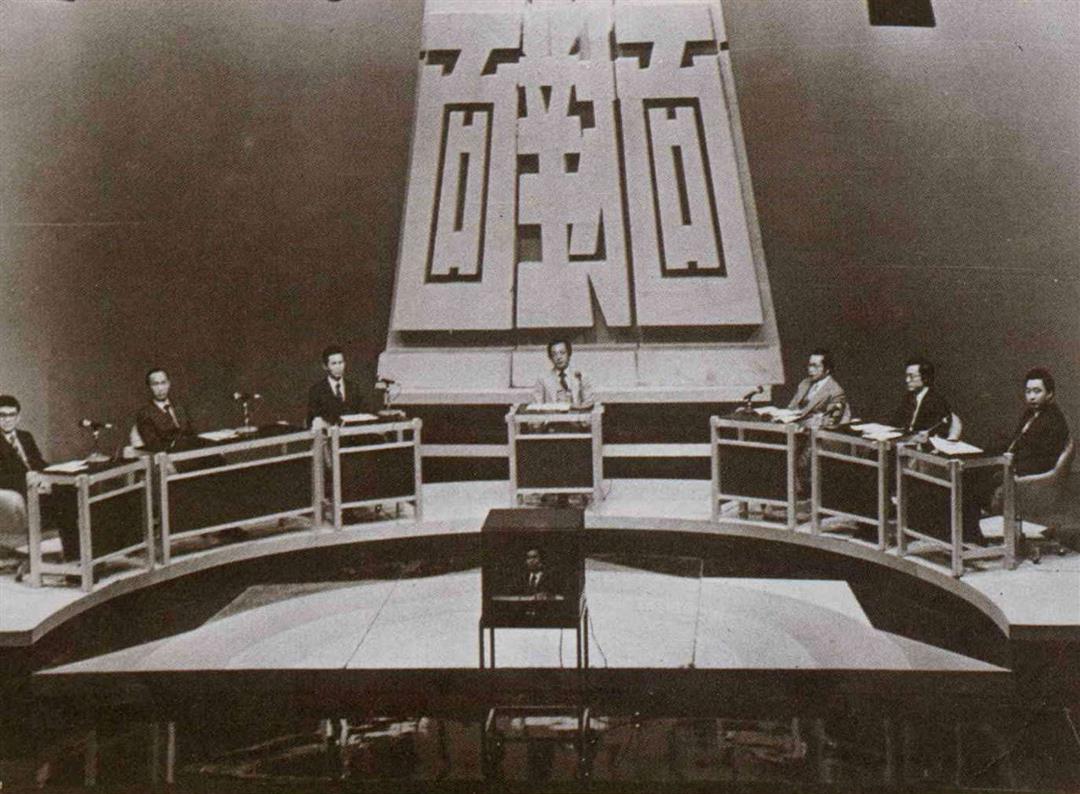
deputy director Chu Chien-chang of the department of organizational affairs of the Central Committee of the Kuomintang, director Tsu Sung-chiu and deputy director Chao Sou-po of the department of cultural affairs, discuss "the Kuomintang after the 4th Plenary Session of the 11th Central Committee.
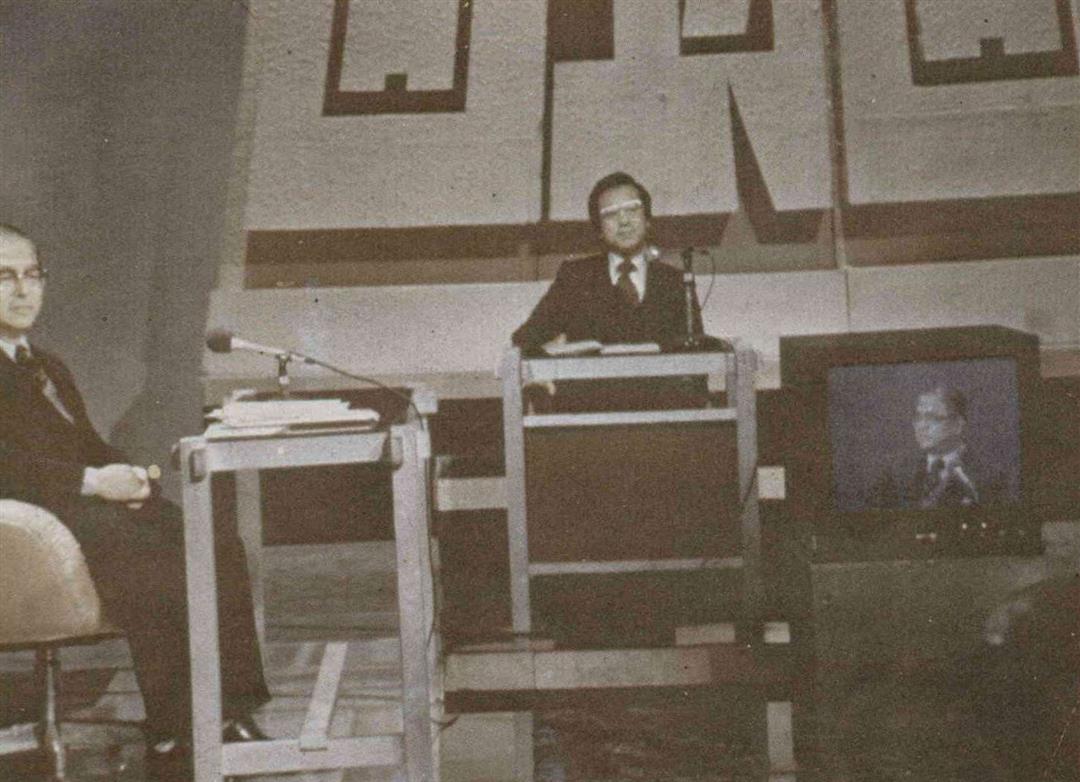
Taiwan Provincial Governor Lin Yang-kang talks on "Taiwan today and tomorrow.